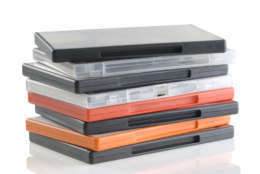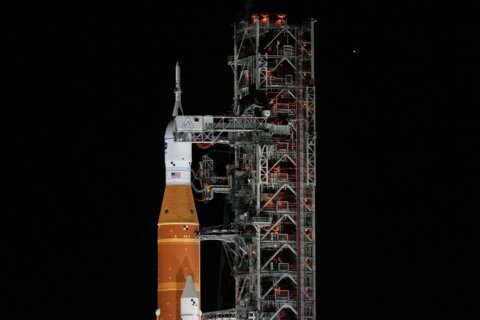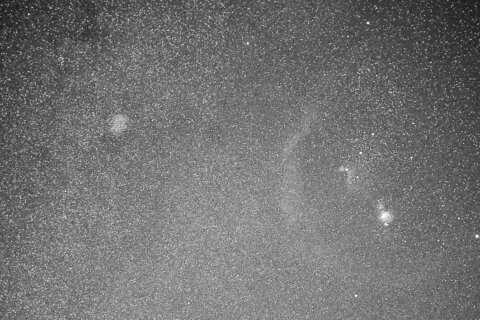WASHINGTON — Need some help on your out-of-this-world holiday shopping? Here’s how to shop for that special sky-gazer — which may even be you — on your holiday list.
As a first step for someone new to astronomy, I recommend getting them a magazine subscription to either (or both) Astronomy or Sky and Telescope (S&T). An added bonus is that when the magazine arrives each month, it will be a reminder of you to that special stargazer. Astronomy and S&T also provide a digital version as part of the magazine subscription, which comes in handy. These monthly magazines and their respective excellent websites are chock full of observing advice, astronomical equipment, pictures, book reviews, astronomy related ads, news and monthly observing guides and star charts. For full disclosure, I have done major feature articles for them and been a total solar eclipse cruise S&T staff member; I have also been an S&T subscriber my whole life. (Thinkstock)
Thinkstock

This is a nifty gift idea that provides your stargazer with astronomical information on a daily basis accompanied by a beautiful and informative astronomical image. These can be used at work or at home. You can find these at Astronomy and Sky and Telescope’s online shops. (Thinkstock)
Thinkstock

There is a literary universe of astronomy and space related books out there. You can browse Amazon and Barnes and Noble to find a title that fits your buying fancy. If you know what piques your stargazer’s interest you can try and buy a book, but I recommend giving them a gift card that they can use to buy a book of their choice. You may want to browse these websites in advance to make sure the gift card has a sufficient value to cover these usually expensive books. This has been a tried and true present to me from family for decades. (Thinkstock)
Thinkstock
For a truly out of this world gift you can buy an actual space rock or more realistically, a piece of one, from the asteroid belt, moon and even Mars. I have been a meteorite (space rock) collector for many years. Truth be told, your avid stargazer is probably frustrated at times with our cloudy weather. Nothing cures this frustration better than holding a piece of the solar system and contemplating where it came from and how it got to earth. You need to know your dealer in buying these amazing rocks that are 4.5 billion years old. New England Meteoritical Services has what I consider to be the best and most reasonably priced presentation sets for purchase, which you can see when you scroll down their webpage. I have personally dealt with them and I highly recommend them. There are dealers you can trust online that are members of the International Meteorite Collectors Association (IMCA). Beware buying in the blind! (Thinkstock)
Thinkstock

A great stocking stuffer is a space-themed movie. The Star Trek movies (new and old), ‘Gravity,’ ‘Europa Report,’ ‘Cosmos the Series’ (original and new versions), “The Martian” and “Interstellar” make great choices. Any of the space-themed segments on National Geographic, Science Channel, Discovery Channel and History Channel are also excellent. (Thinkstock)
Thinkstock
If you have a budding stargazer that wants to see more of the sky than what their eyes alone can provide, quality binoculars are the ticket. A whole new view of the sky becomes possible and — as an added bonus — they can be used in daytime for bird watching and sporting events. A good pair of binoculars will show impressive detail on the Moon, a few galaxies, star clusters and nebulae (you need to know where to look) and if you hold them steady enough, the four main moons of Jupiter. Star colors are richer in binoculars and very pretty to look at. I recommend “7×50” binoculars — the seven indicates magnification while the 50 is the size of each objective lens in millimeters. This is a good compromise between magnification, light gathering ability and field of view. Less magnification means less detail but a wider field of view, while more magnification reduces field of view while giving more detail. I would not go higher than eight in magnification or lower than 50 in objective size for a beginner. There are large astro-binoculars out there but they are for advanced users. You can buy binoculars at sporting goods stores and all of the major chains like Costco, Walmart and Amazon. A good online store that I have used for many years is Orion Telescopes. They have an excellent assortment and great customer service; I stand by their products. They also have extensive descriptions and background information on types of binoculars and how to choose a pair. (AP Photo/David Goldman)
AP Photo/David Goldman
This is the penultimate, and most risky, gift idea on my list. There is nothing quite like getting that first telescope and experiencing “first light” — the first view of the sky through it. It is risky because telescopes are an investment in terms of money and longevity. There is nothing worse than buying a ‘scope that never gets used because it is too complicated, too heavy or of poor quality; they collect dust from never being used. With the right purchase, a quality telescope should last a person’s entire lifetime, or at least a good portion of it. Many nights of enjoyment and discovery at the eyepiece of a good telescope are pure joy to your stargazer. If this is a family member or significant other, you can even join in on the amazement. There are many telescopes out there and to pick just the right one for your stargazer is a real shot in the dark, so to speak, unless you have “insider information.” If your astronomer has spent time studying telescopes and selecting a “final one” and letting you know it — go for it. But make sure there is a return policy that allows you to get your money back if things don’t work out. My recommendation for first telescopes: Put together a gift package or card that says you will bankroll the purchase of a new telescope after a selection process has determined the best telescope to buy. (I recommend setting a price limit as telescopes can cost thousands of dollars) Here are some online sources you can look over to help you in your selection Sky and Telescope, Astronomy and Orion have sections on how to select a telescope and there are books on the subject as well. Going to a local astronomy club and attending a star party provides an opportunity to “test drive” different types of telescopes and look through them at a wide variety of astronomical objects. This will help immensely in the selection of a telescope. We have some great resources here in the D.C. area to do just this. Refer to the Astronomical League list for your area. (Doug Strickland/Chattanooga Times Free Press via AP)
Doug Strickland/Chattanooga Times Free Press via AP



Follow Greg on Twitter @skyguyinva and his daily blog to keep up with the latest news in astronomy and space exploration. Email him at skyguyinva@gmail.com.







